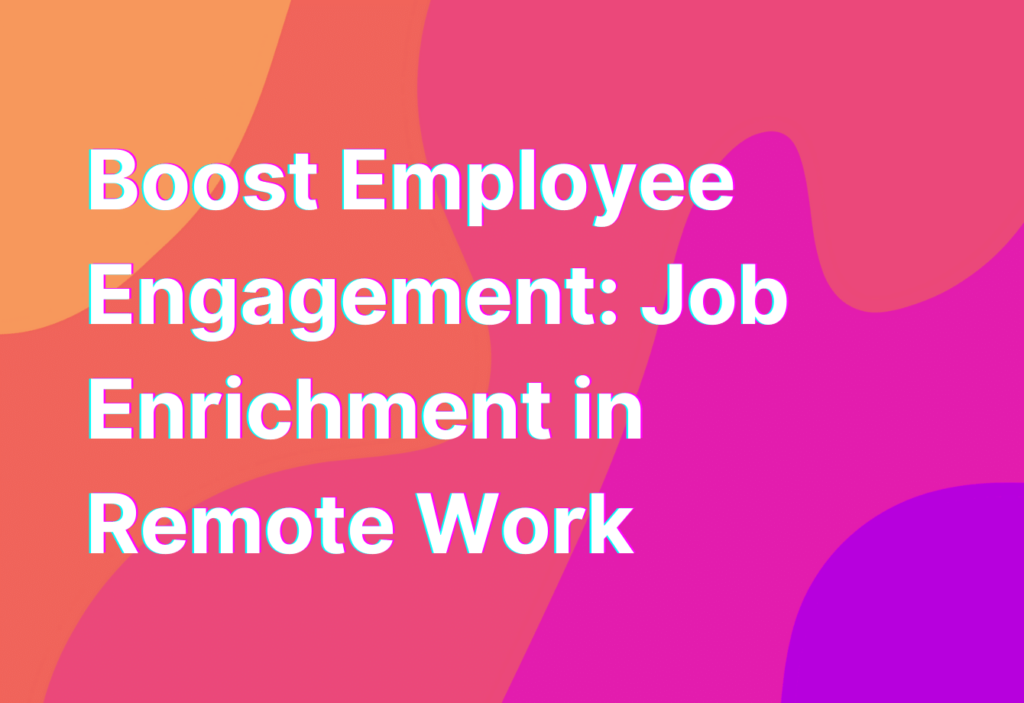Boost Employee Engagement: Job Enrichment in Remote Work
Hey there, remote work enthusiasts! It’s Ashley here, your friendly remote work advocate with 10 years of experience in the tech industry. Today, I want to talk about a topic that is near and dear to my heart: job enrichment in remote work. As we all know, remote work offers incredible flexibility and freedom, but it can also present unique challenges when it comes to keeping employees engaged and motivated. That’s where job enrichment comes in!
What is Job Enrichment?
Before we dive into the nitty-gritty details, let’s start with the basics. Job enrichment is a concept that focuses on enhancing an employee’s job by adding more meaningful and challenging tasks. It aims to provide employees with a sense of purpose, autonomy, and personal growth within their roles. In other words, it’s about making work more fulfilling and satisfying.
Now, you might be wondering, “Why is job enrichment important in remote work?” Well, my friend, remote work can sometimes feel isolating and monotonous. Without the usual office interactions and face-to-face collaboration, employees may start to feel disconnected and disengaged. Job enrichment can help combat these feelings and create a more engaging remote work environment.
The Benefits of Job Enrichment in Remote Work
Job enrichment offers a multitude of benefits for both employees and employers in the remote work setting. Let’s take a look at some of the key advantages:
- Increased job satisfaction: When employees are given more challenging and meaningful tasks, they are more likely to feel satisfied with their work. This, in turn, leads to higher levels of motivation and productivity.
- Enhanced employee engagement: Job enrichment provides employees with a sense of ownership and autonomy over their work. This increased engagement can result in higher levels of creativity, innovation, and overall job performance.
- Reduced turnover: By offering job enrichment opportunities, employers can create a more fulfilling work environment, reducing the likelihood of employees seeking new opportunities elsewhere.
- Improved knowledge transfer: Job enrichment encourages employees to expand their skill sets and learn new things. This not only benefits the individual but also promotes knowledge sharing within the team, leading to a more collaborative and innovative remote work culture.
- Increased employee loyalty: When employees feel valued and challenged in their roles, they are more likely to develop a sense of loyalty towards their organization. This loyalty can result in long-term commitment and dedication.
Implementing Job Enrichment in Remote Work
Now that we understand the importance and benefits of job enrichment, let’s explore some practical ways to implement it in the remote work setting:
- Provide opportunities for skill development: Encourage employees to expand their skill sets by offering training programs, online courses, or mentorship opportunities. This not only enhances their job satisfaction but also equips them with new tools to excel in their roles.
- Assign challenging projects: Give employees the chance to work on projects that stretch their abilities and allow them to showcase their expertise. This not only keeps them engaged but also fosters a sense of accomplishment and pride in their work.
- Promote autonomy and decision-making: Trust your remote employees to make decisions and take ownership of their work. Empowering them to have a say in how they approach their tasks can significantly boost their engagement and motivation.
- Encourage collaboration and knowledge sharing: Foster a culture of collaboration by providing platforms for employees to connect, share ideas, and learn from one another. Tools like Trello, Slack, and Zoom can facilitate seamless communication and knowledge transfer.
- Recognize and reward achievements: Celebrate the accomplishments of your remote team members. Whether it’s a simple shout-out in a team meeting or a more formal recognition program, acknowledging their hard work and contributions goes a long way in boosting engagement and morale.
By implementing these strategies, you can create a remote work environment that is not only productive but also fulfilling and engaging for your employees.
Wrapping Up
Job enrichment plays a crucial role in boosting employee engagement in remote work. By providing employees with meaningful and challenging tasks, you can create a work environment that fosters motivation, creativity, and personal growth. Remember, remote work doesn’t have to be isolating or monotonous. With job enrichment, you can create a remote team that is engaged, productive, and happy.
If you want to learn more about boosting remote employee engagement through knowledge transfer, check out our Knowledge Transfer page. It’s packed with valuable insights and tips to help you create a thriving remote work culture.
That’s all for now, folks! Stay tuned for more remote work advice and insights. Until next time!


